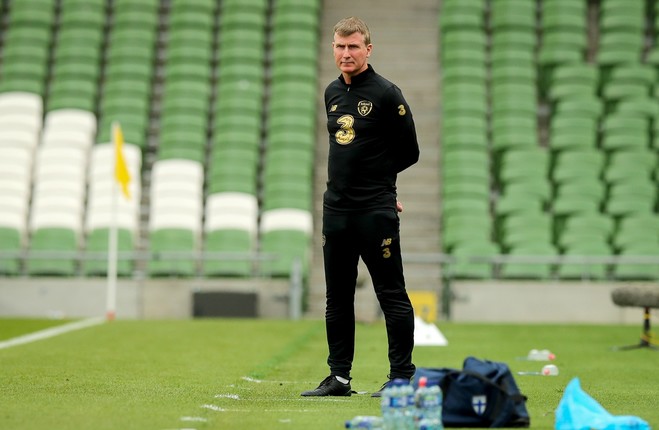SO IT SEEMS it takes more than a week to change a country’s football identity.
On the face of it, Stephen Kenny’s first week as Irish manager has not gone particularly well: a 1-1 draw in Bulgaria and a 1-0 defeat at home to Finland, games in which the defence looked decidedly ropey and the attack familiarly blunt.
Kenny hasn’t been shy in airing his ambitions as Ireland manager, saying at the beginning of his first matchweek in charge that he wanted to change how the world perceives Irish football and slough off associations with the “British style.”
The end of said matchweek has brought the first stirrings of discontent from the sceptics and the Very Online, given Ireland were deeply underwhelming in swathes of both games.
The unhelpful combination of the team’s popularity and their relative lack of games brings extreme scrutiny on every decision the Irish manager makes, but it is much too early to be making any judgments on Kenny and his team yet.
Most reasonable people acknowledge that no Irish manager should be judged on their first couple of results. Steve Staunton, for example, won his first game, while Jack Charlton lost his and drew his second.
It would be absurd, too, to judge Kenny on the result in Slovakia next month, given he was initially appointed specifically not to take charge of it. No, Mick was supposed to be in charge for that one, having qualified thanks to, er, Martin O’Neill’s failure to win a game in the Nations League.
So given it’s too early to properly assess how Kenny is overhauling how Ireland play, some are focusing on why he’s doing it.
Ian Harte articulated this on Thursday night, tweeting, “I’m sorry but this has been awful tonight. All for young lads making their debut, but it’s about winning games of football.”
But the notion Ireland’s blooding of young players or experimenting with their style of play is antithetical to winning games is nonsense, and it’s a lesson we learned in the mass psychological event known internationally as Ireland 1-5 Denmark.
On that occasion, Ireland fell 2-1 behind before half-time and Martin O’Neill responded in blind panic, replacing his midfield and throwing on attackers in the hope something might happen. In the end, to nobody’s surprise, Christian Eriksen ran riot, and Age Hariede ended up thanking O’Neill for giving him so much space.
Ireland didn’t have an attacking plan to trust that night and two years on, against the same opponents but under McCarthy, it was the same old story.
Notions that Kenny is being heedlessly optimistic or idealistic in revolutionising how Ireland play football ignores the pretty large mountain of evidence that the old way simply doesn’t work. We have, bar a couple of spirited exceptions, been somewhere from poor to utterly dreadful for three years’ now.
The lament that “we don’t have the players” gives even more reason to back Kenny in overhauling the style, given he might put them in an attacking system in which they can learn what to do, rather than rely solely on their individual talent.
That doesn’t mean Kenny’s first couple of games should be exempt from criticism.
His defence has looked alarmingly suspect in his first two games, though he has said McCarthy’s team was set-up in such a way to bring the best out of that defence. Some of the issues will be fixed with more energy to press the ball in midfield, with stamina levels in the Irish midfield trio dropping off noticeably in the second half of both games.
This can partly be attributed to players’ lack of match sharpness, given these games were played in pre-season.
Kenny places a great deal of responsibility on the player at the base of midfield, and there are question marks as to whether James McCarthy or Harry Arter have the quality, dynamism, and conviction to vindicate that decision.
Ireland haven’t created too many clear-cut chances from play, either. Aaron Connolly spurned decent chances in both games, although both came from high Irish pressing rather than true craft on their own part.
There have, however, been signs Ireland have at least tried to do something different in attack. Ireland attacked primarily down the left flank in the first half of yesterday’s game, through combinations involving Enda Stevens, Robbie Brady, and Aaron Connolly.
The intention was to use Connolly’s diagonal runs and Stevens’ width to create space for Brady to make penetrative passes with his left foot, with further options offered by Matt Doherty playing high on the right flank and Jayson Molumby tucking inside.
These combinations rarely worked as the players’ passing was often too slow or their touch too heavy, and while this is hardly enough to make zealous and wild-eyed believers out of everyone, it is one example of the change in emphasis in the Irish team.
In his first week, Kenny has trusted youth and has made as many attacking selections as he can, while his players out-passed both of their opponents. He is holding up his end of the bargain, and while yesterday showed this may be a painfully slow process, it’s surely worth sticking with.
What’s the alternative?

